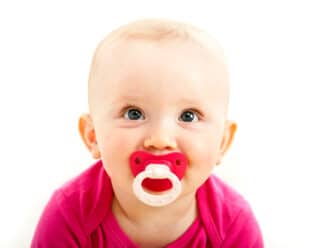
Bethesda Chevy Chase Pediatric Dentistry
4825 Bethesda Avenue
Suite #220
Bethesda, MD 20814
301-941-7374

More Dental Health Articles
Protecting Your Child’s Smile

The Truth About Pacifiers and Thumbsucking
Pacifiers and thumbsucking are a common concern for parents, and for good reason. While pacifiers and thumbsucking can provide comfort to babies, there are potential consequences to prolonged use.
The good news is that pacifiers and thumbsucking are generally harmless for a child’s teeth, as long as the habits don’t continue for too long. Most children will naturally stop sucking on their own by the age of three, but if the habit persists, it can cause problems with their dental development.
The main issue with pacifiers and thumbsucking is that they can cause misalignment of the teeth and jaw. Constant sucking can push the front teeth forward, causing an overbite, or push the lower teeth back, causing an underbite. This can affect the way a child bites, chews, and speaks, and may require orthodontic treatment later on.
Another concern is the effect that sucking can have on the shape of the mouth and palate. Prolonged sucking can cause the roof of the mouth to narrow and become high and arched. This can cause speech problems and make it difficult for permanent teeth to come in properly.
So, what should parents do if their child is a thumbsucker or pacifier user? The first step is to monitor the habit and try to limit it as much as possible. If your child is using a pacifier, try to wean them off of it by the age of one. If they are a thumbsucker, offer other forms of comfort and try to redirect their attention when they start sucking.
If the habit persists beyond the age of three, it’s a good idea to consult with a pediatric dentist. They can evaluate your child’s dental development and recommend any necessary treatment, such as a mouth appliance or orthodontic intervention.
It’s also important to practice good oral hygiene habits to prevent any potential dental problems. Make sure your child brushes their teeth twice a day and flosses regularly, and schedule regular check-ups with their dentist to monitor their dental health.
Pacifiers and thumbsucking can be a source of comfort for babies, but they can also cause dental problems if they continue for too long. As a parent, it’s important to monitor these habits and take steps to limit them if necessary. And don’t forget to prioritize good oral hygiene to keep your child’s teeth healthy and strong!
Tips To Help Parents Stop the Pacifier and Thumbsucking
For pacifiers:
Join with your pediatric dentist and tell your child about giving the pacifier to the Pacifier fairy. You can tell them that there are a lot of babies in need of pacifiers and the pacifier fairy is willing to give a great toy if they place the pacifier under the pillow.
Try cutting the tip of the pacifier to decrease suction- this may help your child ‘s sensory feelings from it.
You can try creative projects, such as planting the pacifier in the backyard. Next day, it will sprout a toy or a nice treat!
Emphasize the point that pacifiers are for babies, just like bottles and diapers. Big kids don’t need them.
Remember, it is not how often the pacifier stays in the mouth, it is for how long it stays in the mouth. If your child needs it to go to sleep, as soon as she/he is sleeping, remove it from the mouth.
Choose your battles- if you have a child that is not feeling well or you have a new baby at home , don’t force the issue. You can say to them, whenever you are ready to be a big kid, we will ask the pacifier fairy to come in.
For thumbsucking:
Thumbsucking is more difficult to stop. Most of the time tinctures or pastes that don’t taste good don’t work well if they are really into it. As the child gets older and goes to daycare or school, peer pressure can help them stop the habit.
Work with your child to make them want to stop and then we can introduce tinctures, gloves or appliances to help them with the habit.
Engage the help of your pediatric dentist: they can be a source of support and encouragement to you and your child.
Other Articles You May Find of Interest...
- Conditions Treated by Oral and Maxillofacial Surgeons in Union City
- How Seasonal Allergies Can Impact Your Dental Health
- Your Complete Guide to Cosmetic Dentistry: Smile Enhancements for Everyday Confidence
- How Gum Contouring Services Reshape Your Smile with Even Gums
- Why Early Pediatric Dentistry Visits Matter for Lifelong Oral Health
- Smile Freely with Expert Invisalign Care
- How Much Does Invisalign Cost?














